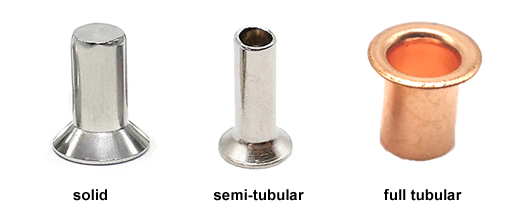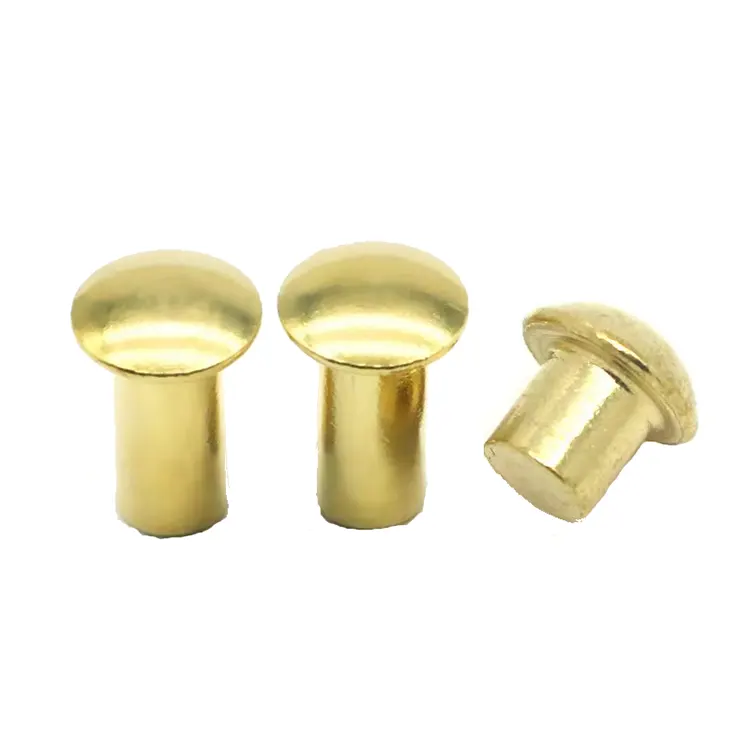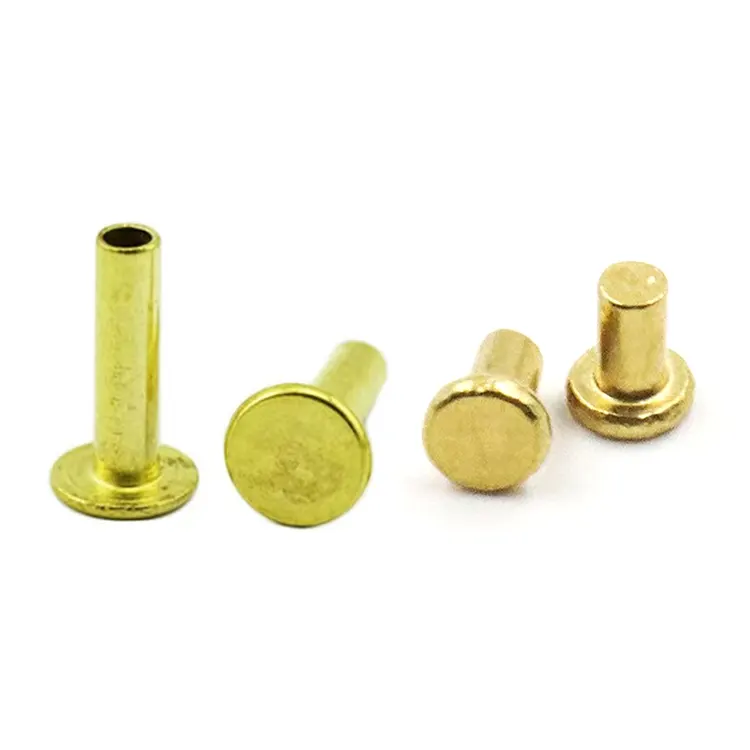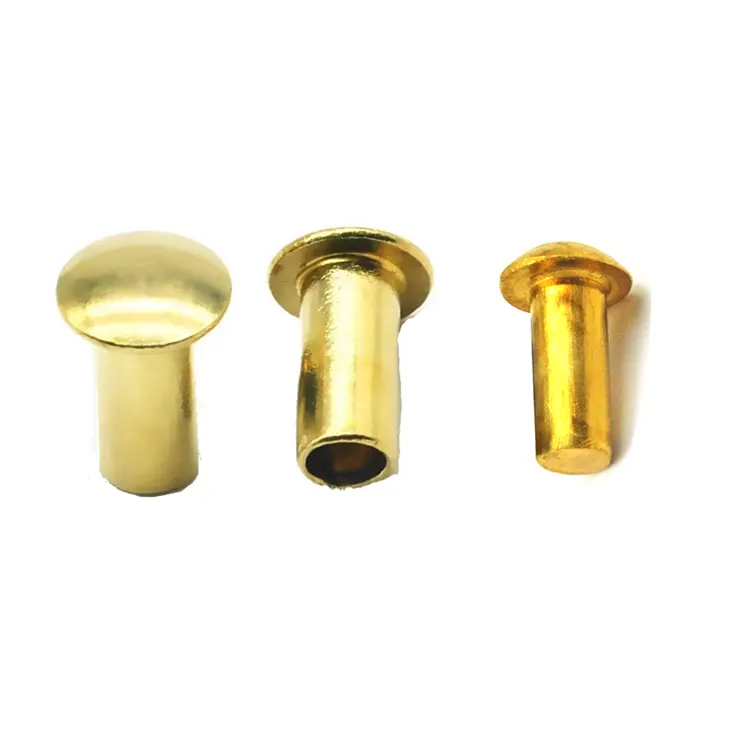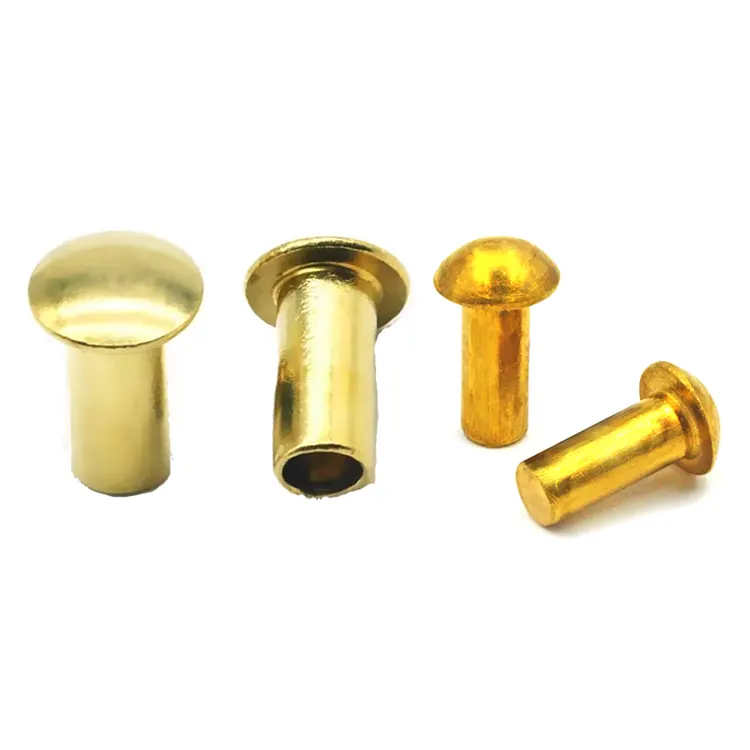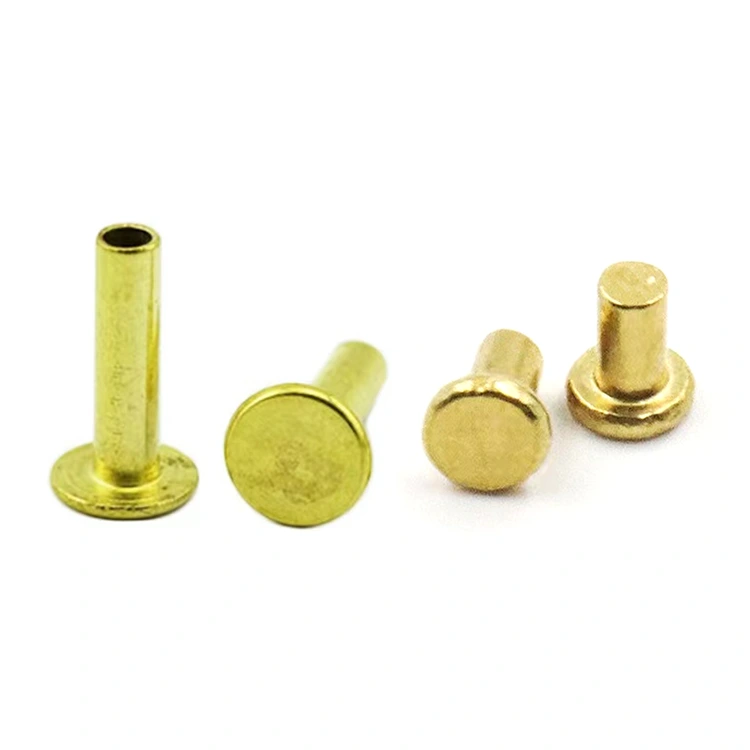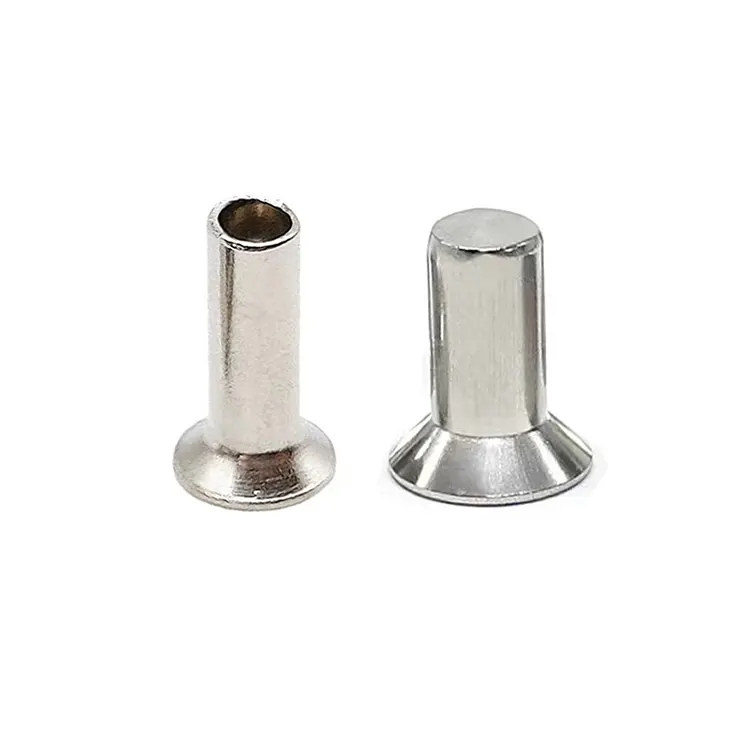Niitit
As one of professional manufacturer in China, Notin would like to provide you Rivets. And we will offer you the best after-sale service and timely delivery.
What is a rivet?
A rivet is a permanent mechanical fastener used to join two or more materials. Rivets work by inserting a metal pin into an aligned hole and deforming the end, creating a strong, secure, and durable connection. Unlike temporary fasteners like screws, rivets do not rely on threads, but instead form a permanent connection, making them ideal for applications requiring high strength, durability, and vibration resistance.
Classification of Rivets
Rivets are typically categorized by head shape, degree of hollowness, or material.
Based on head shape, rivets can be classified as flat head rivets, round head rivets, countersunk head rivets, mushroom head rivets, universal head rivets, truss head rivets, etc.

Based on degree of hollowness, rivets can be classified as solid rivets, semi-tubular rivets, or full tubular rivets.
Based on material, rivets can be classified as brass rivets, stainless steel rivets, steel rivets, aluminum rivets, copper rivets, etc.
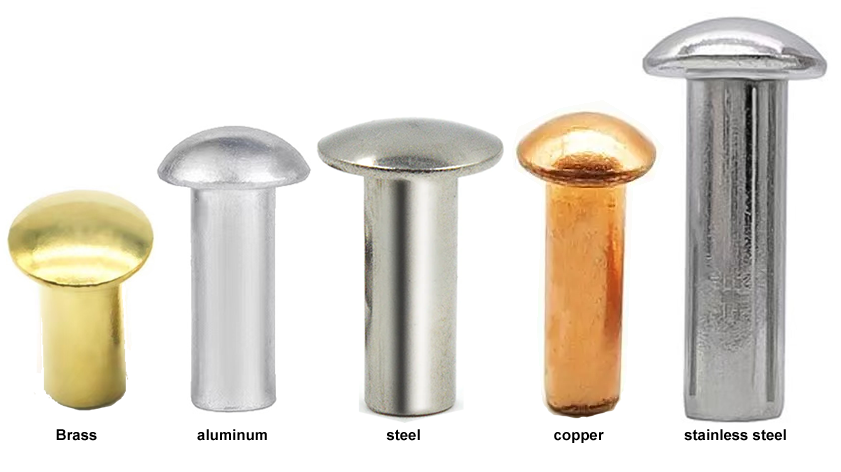
What surface finishes are available for rivets?
Rivet surfaces are typically treated with rust-proofing treatments, primarily electroplating, including zinc plating, nickel plating, chrome plating, tin plating, gold plating, and silver plating. Electroplating is a common rust-proofing method for rivets. It applies a layer of plating to the rivet surface through physical or chemical methods. The plating effectively prevents corrosion and rust, while also providing a certain aesthetic effect.
Another special surface treatment method is head coating. Head coating is performed after the rivet is electroplated. This allows for a variety of colors on the rivet head, achieving an aesthetically pleasing finish.
Aluminum rivets cannot be electroplated, but they can be anodized. Anodizing also allows for a variety of color options, but the unit price is higher than electroplating.
Rust-proofing the rivet surface is crucial, effectively extending the rivet's service life and ensuring a secure connection. Different rust-proofing methods are suitable for different environments and applications, so the choice should be tailored to the specific situation.
- View as
Messinkiset pyöreät niitit
Nuote Metals on erikoistunut messingisten pyöreäpäisten niittien valmistukseen ja myyntiin. Sijaitsemme Dongguanissa, Kiinassa, kaupungissa, jossa on vahva teollinen kehitys. Kupariset puolipulloituneet niitimme koostuvat messingiseoksesta tehdystä varresta ja korkista. Puoliksi pullistuva pään rakenne takaa tasaisen paineen jakautumisen ja estää liitospinnan vaurioitumisen. Niille on ominaista yhdistetty sähkönjohtavuus ja korroosionkestävyys, yksinkertainen rakenne, helppo asennus, korkea luotettavuus ja pitkä käyttöikä.
Lue lisääLähetä kyselyMessinkiniitit
Nuote Metals valmistaa messinkiniittejä Kiinassa, messinkiniitit valmistetaan pääasiassa kuparin ja sinkin seoksesta, materiaalista, joka tarjoaa monia etuja. Messingin erinomainen korroosionkestävyys sallii sen kestävän pitkäaikaisen käytön kosteissa ympäristöissä ruostumatta, joten se sopii ulkokäyttöön tai kosteissa olosuhteissa. Messingillä on myös lujuutta ja kovuutta, minkä ansiosta se kestää mekaanista rasitusta säilyttäen samalla hyvän sitkeyden ja vastustaen murtumista. Messingillä on myös erinomainen sähkön- ja lämmönjohtavuus, joten se soveltuu käytettäväksi elektroniikka- ja lämpölaitteissa. Messingin sileä pinta mahdollistaa helpon galvanoinnin tai kiillotuksen, mikä parantaa sen estetiikkaa. Nämä ominaisuudet tekevät messinkiniiteistä suositun valinnan monilla teollisuudenaloilla.
Lue lisääLähetä kyselyMessinkiset Pan Head -niitit
Nuote Metals on erikoistunut messinkipään niittien valmistukseen. Niitimme on valmistettu H65-messingistä, jolla on korkea messinkipitoisuus, joka on pehmeää ja helposti muotoiltua, eikä se halkeile niittausprosessin aikana. Messinkiset pannunpään niitit koostuvat päästä ja varresta, ja varsi on ontto noin puolet pituudestaan. Asennuksen aikana niitti työnnetään valmiiksi porattuun reikään. Erikoistuneen niittauskoneen ja lävistimen avulla varren pää laajenee ja muodostaa pään toiselle puolelle luoden puristusliitoksen. Tämä prosessi perustuu metallin plastiseen muodonmuutokseen, mikä eliminoi hitsauksen tai liimojen tarpeen, mikä tekee siitä yksinkertaisen ja tehokkaan.
Lue lisääLähetä kyselyMessinkiset sienipään niitit
Messinkiset sienipääniitit koostuvat päästä ja rungosta. Pää on pyöreä ja hieman litistynyt, muistuttaa sienen hattua. Runko on puoliontto, eli sen keskellä on reikä, mutta se ei mene kokonaan läpi. Näitä kutsutaan messingisiksi puolionttoiksi sienipääniiteiksi. Joillakin niiteillä on kiinteä runko, jota kutsutaan messingin kiinteiksi sienipääniiteiksi. Asennuksen aikana käytetään erikoistyökalua rungon työntämiseen valmiiksi porattuun reikään. Kehon muotoa käytetään painetta, jolloin se laajenee ja tarttuu materiaaliin, mikä luo turvallisen liitoksen. Nuote Metals on erikoistunut näiden messinkisten sienipääniittien valmistukseen.
Lue lisääLähetä kyselyMessinkiset litteät niitit
Messingiset litteät niitit ovat metallitankoja, joiden toisessa päässä on korkki. Ne saavuttavat niitauksen muodonmuutoksen tai häiriösovituksen kautta ja ovat yleinen kiinnitys. Litteä pää vähentää pinnan ulkonemia, joten se sopii sovelluksiin, jotka vaativat suurta tasaisuutta. Messingin korroosionkestävyys varmistaa liitoksen vakauden myös kosteissa ja syövyttävissä ympäristöissä. Nuote Metals on erikoistunut messingin tasapäisten niittien valmistukseen. Meillä on tuhansia muotteja ja voimme tuottaa erilaisia niittimäärityksiä. Tuemme myös räätälöityjä malleja ja näytteitä.
Lue lisääLähetä kyselyMessinkiset upotetut niitit
Messinkiset upotetut niitit koostuvat pääasiassa päästä ja varresta. Upotettu pää mahdollistaa asennuksen työkappaleen pinnan tasolle, mikä eliminoi ulkonemat, jotka voivat vaikuttaa ulkonäköön tai toimintaan. Puoliontto varsi deformoituu niittausprosessin aikana, jolloin saadaan yhteys. Tämä rakenne ei ainoastaan paranna asennuksen tehokkuutta, vaan myös lisää liitäntöjen luotettavuutta. Nuote Metals on erikoistunut messingisten uppokantaisten niittien valmistukseen, joissa on korkea tarkkuus ja sileä, naarmuuntumaton pinta. Toivotamme ystävät kaikkialta maailmasta tervetulleiksi vierailemaan yrityksemme kanssa ja tekemään yhteistyötä kanssamme.
Lue lisääLähetä kyselyWhat are the advantages of rivets over other fasteners?
1. Ease of Installation
Rivets are fast to install, and even fully automated for high-volume applications, resulting in a simple and efficient operation process.
2. Connection Reliability
The riveting process is standardized, with strict quality control, resulting in highly stable connections. Visual inspection allows for quick verification of connection quality.
3. Vibration and Impact Resistance
Rivets connect through deformation or interference fit, providing strong clamping force and excellent vibration resistance, capable of withstanding vibration and shock.
4. Low Cost
Rivets are easy to install and can be fully automated, saving significant labor costs.
What are the advantages and disadvantages of rivets made of different materials?
Aluminum Rivets
Advantages: Lightweight, reduces overall product weight, low cost, suitable for general civilian applications.
Disadvantages: Low tensile and shear strength, unsuitable for high-strength workpieces, prone to electrochemical corrosion when in contact with metals such as stainless steel.
Stainless Steel Rivets
Advantages: Strong corrosion resistance, high hardness, suitable for high-strength workpieces (such as marine equipment)
Disadvantages: Higher cost, typically more expensive than aluminum rivets of the same specification.
Brass and Copper Rivets
Advantages: Excellent conductivity (such as connecting electronic components), good corrosion resistance.
Disadvantages: Higher cost, more difficult to process.
Steel Rivets
Advantages: High hardness, high connection reliability, and wide applicability.
Disadvantages: Compared to other materials, iron rivets are more prone to rusting.
What are the main applications of rivets?
Rivets have a wide range of uses, from small items like a pair of scissors to large items like airplanes and ships, as well as in high-precision medical applications.
Industrial Manufacturing
Rivets are used in a wide variety of industrial fields, wherever there is a need to connect two or more materials.
Electronics
Rivets secure heat sinks and chips, providing both vibration damping and noise reduction, and are widely used in the cooling systems of electronic products such as computers and mobile phones.
Automotive
Rivets are widely used to connect components of automobile bodies and chassis, such as doors and hoods. Their lightweight and corrosion-resistant properties make them an indispensable joining method in automotive manufacturing.
Aerospace
In aircraft manufacturing, rivets are used to connect different fuselage components, such as wings and tailplanes. Millions of rivets create high-strength, corrosion-resistant joints. Aluminum and titanium alloy rivets are often used to connect components of corresponding materials, ensuring stability in extreme environments.
Rivets are used everywhere. The above examples only represent a small number of their applications. We see rivets everywhere in our daily lives, such as on scissors, folding beds, and strollers etc. Rivets can be customized to different sizes and materials depending on the application.
Nuote Metals has specialized in the rivet industry for over a decade. Our factory is located in Dongguan, a city known as the "World Factory," a city with a developed industry and convenient transportation. This allows us to respond quickly when acquiring raw materials and supporting surface treatments, meeting our customers' needs for quick access to samples and bulk orders. We produce 10 million rivets daily and have molds of various specifications, allowing us to produce rivets as small as 0.8mm and as large as 10mm. We welcome your inquiries and visits.






